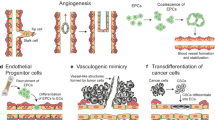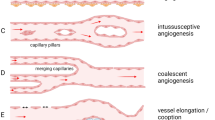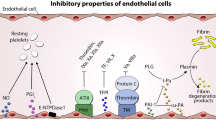Abstract
CD44 is the main cellular receptor for hyaluronic acid (HA). We previously found that overexpression of CD44 inhibited tumor growth of mouse fibrosarcoma cells in mice. Here, we show that soluble recombinant CD44 HA-binding domain (CD44-HABD) acts directly onto endothelial cells by inhibiting endothelial cell proliferation in a cell-specific manner. Consequently, soluble recombinant CD44-HABD also blocked angiogenesis in vivo in chick and mouse, and thereby inhibited tumor growth of various origins at very low doses (0.25 mg/kg × day). The antiangiogenic effect of CD44 is independent of its HA-binding capacity, since mutants deficient in HA binding still maintain their antiangiogenic and antiproliferative properties. Recombinant CD44-HABD represents a novel class of angiogenesis inhibitors based on a cell-surface receptor.






Similar content being viewed by others
References
Ahrens T, Sleeman JP, Schempp CM, Howells N, Hofmann M, Ponta H, Herrlich P and Simon JC . (2001). Oncogene, 20, 3399–3408.
Arch R, Wirth K, Hofmann M, Ponta H, Matzku S, Herrlich P and Zoller M . (1992). Science, 257, 682–685.
Aruffo A, Stamenkovic I, Melnick M, Underhill CB and Seed B . (1990). Cell, 61, 1303–1313.
Bajorath J, Greenfield B, Munro SB, Day AJ and Aruffo A . (1998). J. Biol. Chem., 273, 338–343.
Bakhiet M, Tjernlund A, Mousa A, Gad A, Strömblad S, Kuziel WA, Seiger A and Andersson J . (2001). Nat. Cell. Biol., 3, 150–157.
Bartolazzi A, Nocks A, Aruffo A, Spring F and Stamenkovic I . (1996). J. Cell. Biol., 132, 1199–1208.
Bennett KL, Jackson DG, Simon JC, Tanczos E, Peach R, Modrell B, Stamenkovic I, Plowman G and Aruffo A . (1995). J. Cell. Biol., 128, 687–698.
Bergers G, Brekken R, McMahon G, Vu TH, Itoh T, Tamaki K, Tanzawa K, Thorpe P, Itohara S, Werb Z and Hanahan D . (2000). Nat. Cell. Biol., 2, 737–744.
Brooks PC, Montgomery AM and Cheresh DA . (1999). Methods Mol. Biol., 129, 257–269.
Cichy J, Bals R, Potempa J, Mani A and Pure E . (2002). J. Biol. Chem., 277, 44440–44447.
Culty M, Nguyen HA and Underhill CB . (1992). J. Cell. Biol., 116, 1055–1062.
Dimitroff CJ, Lee JY, Rafii S, Fuhlbrigge RC and Sackstein R . (2001). J. Cell. Biol., 153, 1277–1286.
Griffioen AW, Coenen MJ, Damen CA, Hellwig SM, van Weering DH, Vooys W, Blijham GH and Groenewegen G . (1997). Blood, 90, 1150–1159.
Guan KL and Dixon JE . (1991). Anal. Biochem., 192, 262–267.
Gunthert U, Hofmann M, Rudy W, Reber S, Zoller M, Haussmann I, Matzku S, Wenzel A, Ponta H and Herrlich P . (1991). Cell, 65, 13–24.
Guo N, Krutzsch HC, Inman JK and Roberts DD . (1997). Cancer Res., 57, 1735–1742.
Guo Y, Ma J, Wang J, Che X, Narula J, Bigby M, Wu M and Sy MS . (1994). Cancer Res., 54, 1561–1565.
Hanahan D and Folkman J . (1996). Cell, 86, 353–364.
Holmgren L, O'Reilly MS and Folkman J . (1995). Nat. Med., 1, 149–153.
Jalkanen S and Jalkanen M . (1992). J. Cell. Biol., 116, 817–825.
Kajita M, Itoh Y, Chiba T, Mori H, Okada A, Kinoh H and Seiki M . (2001). J. Cell. Biol., 153, 893–904.
Katoh S, McCarthy JB and Kincade PW . (1994). J. Immunol., 153, 3440–3449.
Kaya G, Rodriguez I, Jorcano JL, Vassalli P and Stamenkovic I . (1997). Genes Dev., 11, 996–1007.
Kerbel R and Folkman J . (2002). Nat. Rev. Cancer, 2, 727–739.
Koch AE, Halloran MM, Haskell CJ, Shah MR and Polverini PJ . (1995). Nature, 376, 517–519.
Kogerman P, Sy MS and Culp LA . (1997). Oncogene, 15, 1407–1416.
Kohda D, Morton CJ, Parkar AA, Hatanaka H, Inagaki FM, Campbell ID and Day AJ . (1996). Cell, 86, 767–775.
Lesley J, Hyman R and Kincade PW . (1993). Adv. Immunol., 54, 271–335.
Lokeshwar VB, Iida N and Bourguignon LY . (1996). J. Biol. Chem., 271, 23853–23864.
Mori H, Tomari T, Koshikawa N, Kajita M, Itoh Y, Sato H, Tojo H, Yana I and Seiki M . (2002). EMBO J., 21, 3949–3959.
Nguyen M, Strubel NA and Bischoff J . (1993). Nature, 365, 267–269.
Okamoto I, Kawano Y, Tsuiki H, Sasaki J, Nakao M, Matsumoto M, Suga M, Ando M, Nakajima M and Saya H . (1999). Oncogene, 18, 1435–1446.
Okamoto I, Tsuiki H, Kenyon LC, Godwin AK, Emlet DR, Holgado-Madruga M, Lanham IS, Joynes CJ, Vo KT, Guha A, Matsumoto M, Ushio Y, Saya H and Wong AJ . (2002). Am. J. Pathol., 160, 441–447.
O'Reilly, MS, Boehm T, Shing Y, Fukai N, Vasios G, Lane WS, Flynn E, Birkhead JR, Olsen BR and Folkman J . (1997). Cell, 88, 277–285.
O'Reilly MS, Holmgren L, Chen C and Folkman J . (1996). Nat. Med., 2, 689–692.
O'Reilly MS, Holmgren L, Shing Y, Chen C, Rosenthal RA, Moses M, Lane WS, Cao Y, Sage EH and Folkman J . (1994). Cell, 79, 315–328.
O'Reilly MS, Pirie-Shepherd S, Lane WS and Folkman J . (1999). Science, 285, 1926–1928.
Parangi S, O'Reilly M, Christofori G, Holmgren L, Grosfeld J, Folkman J and Hanahan D . (1996). Proc. Natl. Acad. Sci. USA, 93, 2002–2007.
Savani RC, Cao G, Pooler PM, Zaman A, Zhou Z and DeLisser HM . (2001). J. Biol. Chem., 276, 36770–36778.
Schmits R, Filmus J, Gerwin N, Senaldi G, Kiefer F, Kundig T, Wakeham A, Shahinian A, Catzavelos C, Rak J, Furlonger C, Zakarian A, Simard JJ, Ohashi PS, Paige CJ, Gutierrez-Ramos JC and Mak TW . (1997). Blood, 90, 2217–2233.
Screaton GR, Bell MV, Jackson DG, Cornelis FB, Gerth U and Bell JI . (1992). Proc. Natl. Acad. Sci. USA, 89, 12160–12164.
Sherman LS, Rizvi TA, Karyala S and Ratner N . (2000). J. Cell. Biol., 150, 1071–1084.
Stellmach V, Crawford SE, Zhou W and Bouck N . (2001). Proc. Natl. Acad. Sci. USA, 98, 2593–2597.
Thomas L, Byers HR, Vink J and Stamenkovic I . (1992). J. Cell. Biol., 118, 971–977.
Trochon V, Mabilat C, Bertrand P, Legrand Y, Smadja-Joffe F, Soria C, Delpech B and Lu H . (1996). Int. J. Cancer, 66, 664–668.
van der Voort R, Taher TE, Wielenga VJ, Spaargaren M, Prevo R, Smit L, David G, Hartmann G, Gherardi E and Pals ST . (1999). J. Biol. Chem., 274, 6499–6506.
Weber GF, Ashkar S, Glimcher MJ and Cantor H . (1996). Science, 271, 509–512.
Yu Q and Stamenkovic I . (1999). Genes Dev., 13, 35–48.
Yu Q and Stamenkovic I . (2000). Genes Dev., 14, 163–176.
Yu Q, Toole BP and Stamenkovic I . (1997). J. Exp. Med., 186, 1985–1996.
Zhang H, Li Z, Viklund E. and Strömblad S . (2002). J. Cell. Biol., 158, 1287–1297.
Acknowledgements
We thank Dr Anatoli Onischenko for the help with the chick CAM angiogenesis model. This work was supported by grants from the Swedish Cancer Society, the Estonian Science Foundation (3841, 5129) and Howard Hughes Medical Institute's International Research Fellowship. PK is an International Senior Research Fellow of the Wellcome Trust.
Author information
Authors and Affiliations
Corresponding author
Rights and permissions
About this article
Cite this article
Päll, T., Gad, A., Kasak, L. et al. Recombinant CD44-HABD is a novel and potent direct angiogenesis inhibitor enforcing endothelial cell-specific growth inhibition independently of hyaluronic acid binding. Oncogene 23, 7874–7881 (2004). https://doi.org/10.1038/sj.onc.1208083
Received:
Revised:
Accepted:
Published:
Issue Date:
DOI: https://doi.org/10.1038/sj.onc.1208083
- Springer Nature Limited




